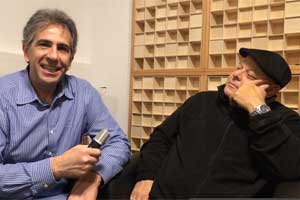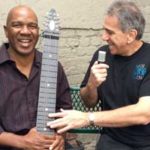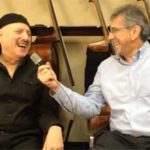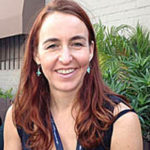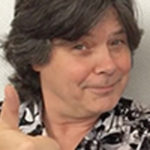Conversation with multi-Grammy winner, whose gigs have spanned from the Tommy Dorsey Band to Will.i.am (with practically everyone else along the way)
Exclusive interview with FBPO’s Jon Liebman
January 21, 2013
Kevin “Brandino” Brandon is a seven-time GRAMMY-winning bass player, producer, composer and arranger. His work can be heard in a wide variety of musical genres on recordings by Robby Krieger, Outkast, Justin Timberlake, Mary J. Blige, Brandy, Jamiroquai, Jesse McCartney, Joss Stone, Jamie Foxx and countless others. Brandino has also earned three Emmy awards as a composer for TV shows, including Santa Barbara, Gene Simmons – Family Jewels, The Millionaire Matchmaker, Pit Boss and several others.
FBPO: Tell me about your musical upbringing. I understand you come from a musical family.
Brandino: Yes. I started to play piano at 4 years old, sax at 7, bass at 9 and classical flute at 13. My sister played piano and my brother played saxophone. With my parents coming from New Orleans, we had a lot of music in the house, all different types of music to listen to and learn from. We played a lot of gigs around town in the family band while I was in grade school and high school. The band played commercial music that was on the radio at that time. We played all types of music to get gigs and entertain any kind of audience.
FBPO: How did you happen to settle on the bass?
Brandino: My brother and sister had a family band and they needed a bass player. I wanted to play drums, but because of my handicap, my father felt another instrument would be a better choice. Since they needed a bass player, I was elected for the job! I started to listen to records on an old record player that played at 33 1/3 and 45, so I put my ear on top of the box to listen to the bass notes to figure out the progression of the song. My brother showed me where the notes were on the bass and I did the rest.
By the time I entered high school, I needed to learn how to read music, so I studied classical flute privately from Milton Hall in Watts, California. Down the street, I started to take lessons from a Mr. Hamilton, a Dixieland bass player who told me about the Simandl bass method book. I started to teach myself how to read on bass, which wasn’t a problem because I could read flute music. Switching to acoustic bass from electric, though, is no joke, so I was advised to seek out a classical teacher who could take me through the ropes professionally. I had some great teachers: David Borkenhagen, Nat Gangursky, Ami Porat and Barry Lieberman, principal of the Los Angeles Philharmonic.
FBPO: Who were your influences as a young student of bass?
Brandino: Ray Brown, Paul Chambers, Jack Bruce, Chuck Rainey, James Jamerson, Wilton Felder… the list goes on.
FBPO: You seemed destined to become a professional musician. Tell me about your music education.
Brandino: Growing up in South Central LA, back in the day, finding something you can do to make money is the number one priority. My mother told me, “If you’re going to be a professional musician, you better know how to read music.” So, besides the things I mentioned earlier, Cerritos College had a music summer camp for kids to keep them off the streets. I went to camp every summer during high school, playing in big bands and combo groups and taking classes in music theory. That’s where I met my friends Poncho Sanchez and the Banda Brothers.
Also, while I was in high school, my brother was attending Mount Saint Mary’s College in Brentwood, so I hitched a ride with him to school and studied with his music theory teacher, Dr. Duran. I studied Harmony, by Walter Piston, Twentieth-Century Harmony, by Vincent Persichetti, and Counterpoint, by Kent Wheeler Kennan. By the time I graduated high school, I had already had two years of college theory and harmony under my belt.
In my senior year, I did a recital on flute, which turned into an audition tape for USC. I guess the tape worked because my band director told me if I wanted to go USC, where he had graduated, there was a full four-year scholarship waiting for me. My parents were pretty upset when I declined, but I really wanted to pursue a jazz career instead of an academic career at that time. So when I got an offer to go New York with the Tommy Dorsey Band, I was gone. When I returned from the road, I went back to school at Long Beach City and State College.
FBPO: At what point did your career really begin to take off?
Brandino: When I got the gig with the Tommy Dorsey Band, I was able to save enough money to move up into town from South Central. People told me for years if I lived in town I could get more work, but if I lived an hour outside of town and there was a last-minute call for a sub in town, I wouldn’t be able to make the gig in time. I also didn’t have any professional credits to my name yet, so by taking the TDB gig, I put myself in a much better position to get recommended.

At Bass Player Live! October 2012
By moving to Hollywood, my entire career took off. All the TV, movie and record industries were there and clubs like Donte’s, The Sound Room, Carmelo’s, Marla’s Memory Lane and The Parisian Room where in LA and a diversity of musical experiences was all over the city. I would get home at 2:00 a.m. from a bebop gig with Frank Rosolino and Billy Higgins and get a call at 7:00 a.m. to be at Motown Records in Hollywood at 9:00 a.m. to record with James Gadson and David T. Walker for many different Motown artists or drive to Santa Barbara to record with the Beach Boys. Things were wild and crazy back then, but it was great!
FBPO: Tell me about meeting Louis Armstrong. That must have been very special.
Brandino: I was a patient at Shiners Hospital the first five years of my life for surgeries on my hip, legs and feet. At 5 years of age, I was released from the hospital as an outpatient and was able to live with my family. On my 5th birthday, as a treat, my father took me to the Hollywood Palladium to see Louis Armstrong. The spirit of this man singing and playing trumpet was something special that I still remember today. After the concert, my father was able to get backstage to meet Mr. Armstrong. While my father was carrying me on his shoulder, I was able to shake Armstrong’s hand. I remember Louis telling my father, “You have a cute kid.”
FBPO: How would you describe your experience with the Tommy Dorsey Orchestra?
Brandino: The TDB was a vehicle for me to push a big band seven days a week, for four to five hours a night, traveling through every little city on the East Coast you could name, while developing my hands to play the upright bass. It was a musical experience that led me to many more musical situations. I got a lot of respect from my elders, since I did what they did as a kid, growing up playing big bands.
FBPO: Tell me about your humanitarian organization, You Can Do it if You Try.
Brandino: You Can Do It If You Try is a non-profit organization designed to offer hope and encouragement to the physically and mentally challenged and underprivileged in the inner cities worldwide. You Can Do It If You Try serves to spiritually motivate people of all ages through music, learning, arts, speech and example. This program, God willing, will be able to develop, focus and help people find their full potential and make them self sufficient in their lives and in society.
FBPO: What else is keeping you busy these days?
Brandino: I worked on a new Justin Timberlake CD, Will.i.am’s new CD and the first song ever broadcast from Mars by Will.i.am. I went to Germany in September for the 30th Warwick anniversary party with thirty-eight Warwick endorsees worldwide, which was a blast in itself. I’m working on Brandino’s Melodies and Songbook, Volume 2, using Sibelius software. I’m also writing TV music for Ancient Aliens, Lock Up and Pit Bulls and Parolees and working on my new CD, using the Warwick SC 5- and 6-string basses. The list goes on.
FBPO: What about the future? What else would you like to do that you haven’t already accomplished?
Brandino: Besides being the MD/bassist on a primetime TV show, making three-to-five million dollars a year? I’m working on a classical bass quartet, performing traditional and contemporary music. The ensemble will be recording live-to-record with my new 5-string cello/bass by the Eastman Music Company.
FBPO: What would you be if you weren’t a bass player?
Brandino: A professional baseball pitcher for the New York Yankees.
